Cloud computing might not be the oldest among the industries, but it is for sure the fastest-growing one. Statistics indicate that over 90% of companies in business today rely on cloud services in one way or another. Some companies use it as a means of storage, while for others, it presents as a chance for remote work, collaboration, and overall data security.
However, many organizations still struggle to leverage cloud computing to attain their digital transformation goals. This may be ignorance, resistance to change, or even budgetary limits.
If you are a business owner, a CIO, a CTO, or a decision maker still weighing the benefits of custom cloud applications against your existing systems, this blog is for you.
Read on and understand how cloud computing transforms the shape of business and why custom cloud applications hold the key to successful digital transformation.
How Cloud Applications Accelerate Digital Transformation
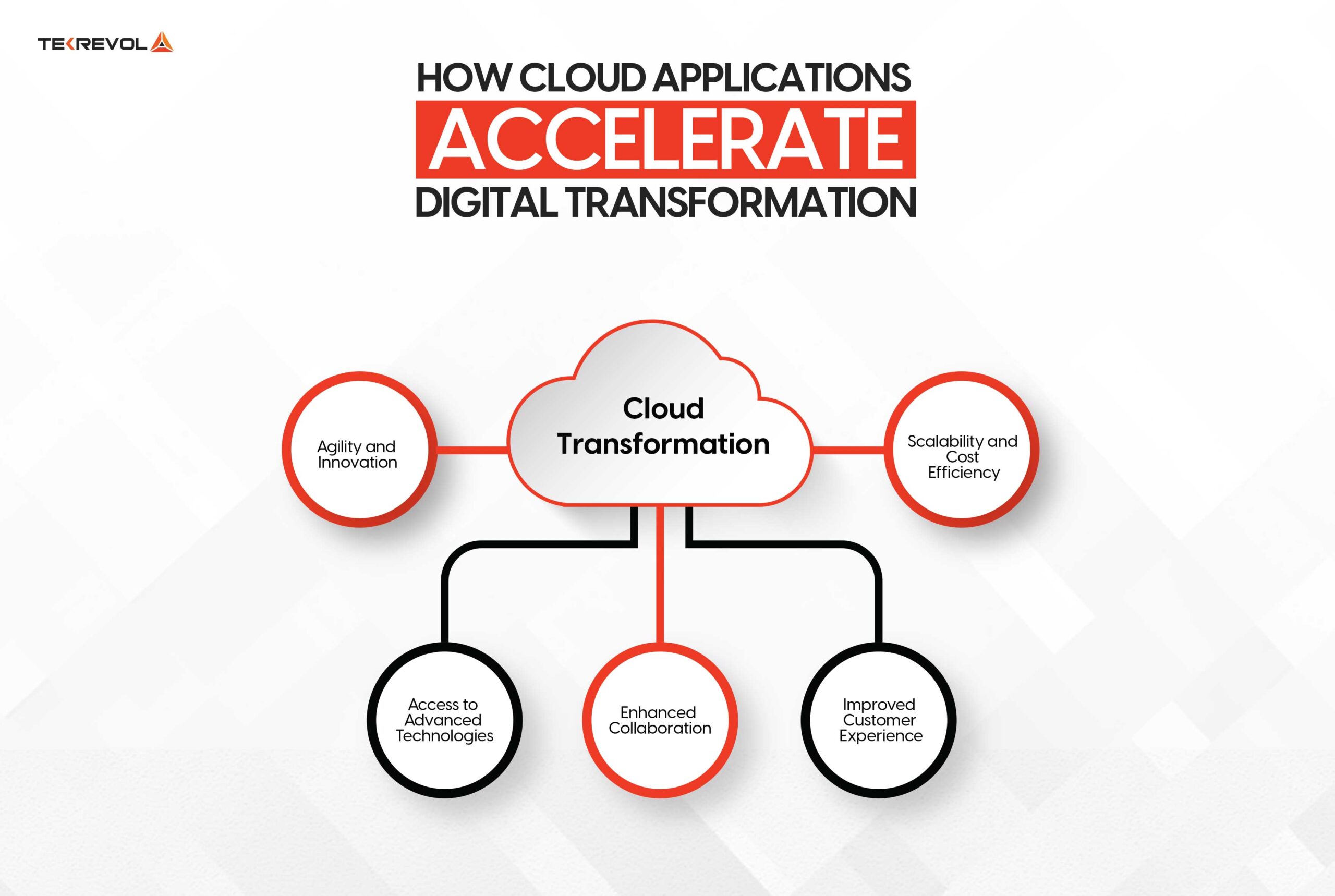
Digital transformation is all about using technology to improve and change the way businesses operate and engage with customers. The goal is to streamline processes, increase efficiency, and stay competitive in the digital age.
This pandemic compelled corporations to adapt rapidly to new technologies, thereby increasingly leveraging the digital approach. According to a 2020 Gartner survey, over 69% of the board directors admitted that the pandemic accelerated their digital strategies and hastened plans to rethink the way they operate.
The core of digital transformation lies within cloud applications. The agility, scalability, and innovation that will help businesses achieve their desired needs and goals. It is about offering the possibility of remote work or improving customer experience with the help of cloud apps. It becomes easier for any business to adapt fast, experiment with new technologies, and scale as needed with demand.
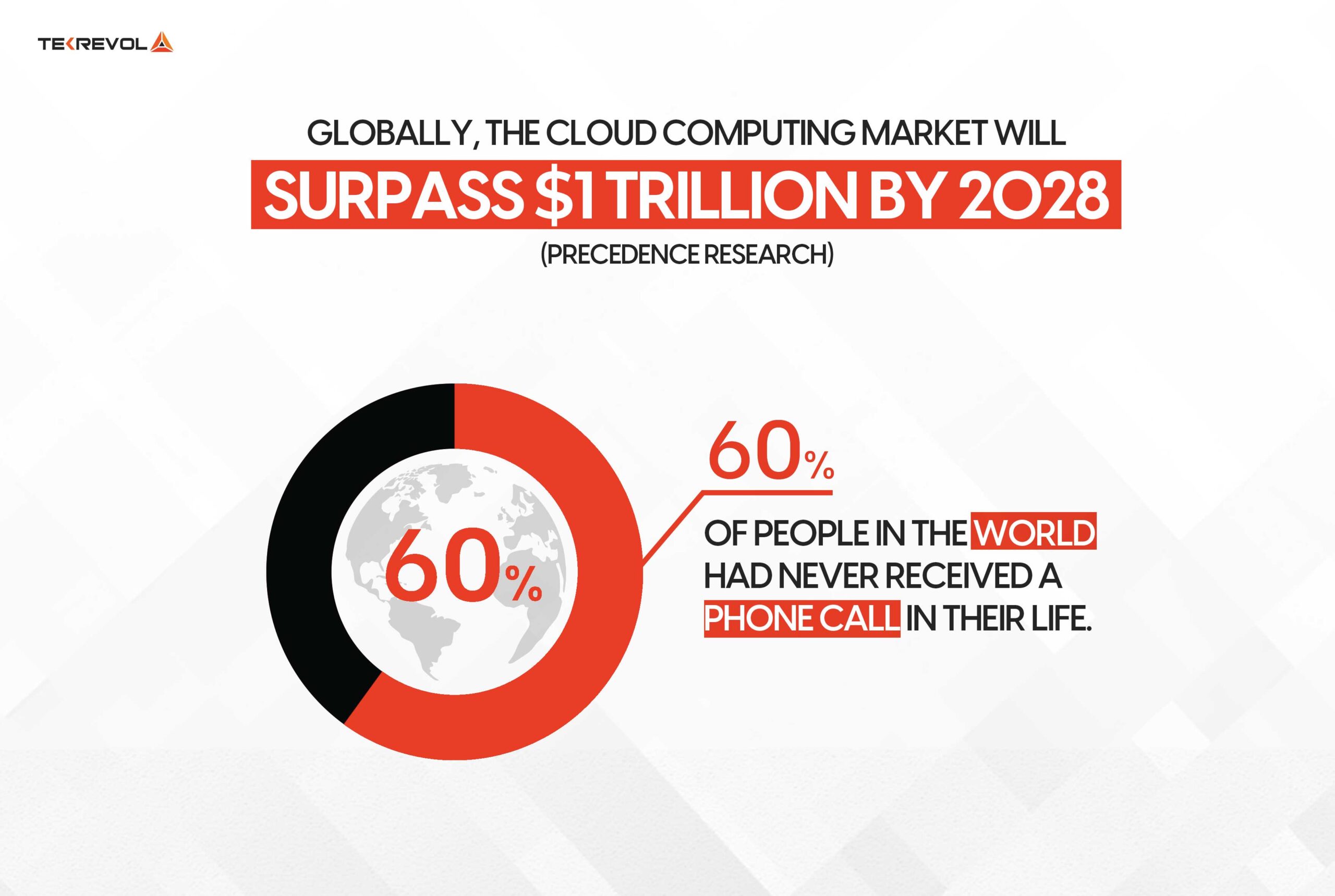
Here is how cloud computing supports digital transformation:
- Agility and Innovation
The cloud-based applications enable companies to easily bring new services and products to market. This is business agility, or the ability to be more experimental and innovative and to introduce new solutions into the market faster.
- Scalability and Cost Efficiency
Cloud applications make it easier for companies to scale up or down as the need arises because they can avoid considerable, one-time investments in hardware. Scalability in cloud applications reduces IT costs and increases flexibility.
- Access to Advanced Technologies
The cloud providers provide access to the latest AI, machine learning, and data analytics. Businesses do not have to invest highly in infrastructure to acquire these advanced tools for enhancing operations.
- Enhanced Collaboration
Cloud-based apps facilitate teamwork in any part of the world. It increases productivity and helps businesses handle remote workers with ease.
- Improved Customer Experience
Deep insights into customer behavior can be provided by cloud solutions through the processing of large data volumes. Such services enhance the ability of businesses to offer customized services, thereby increasing customer satisfaction and loyalty.
In essence, cloud applications are essential for any company looking to future-proof its business by providing the tools needed to innovate and grow.
Want to Achieve a Successful Launch? Read Our Comprehensive Guide On: Soft Launch vs. Hard Launch: What’s the Difference?
Benefits Of Custom Cloud Applications In Digital Transformation
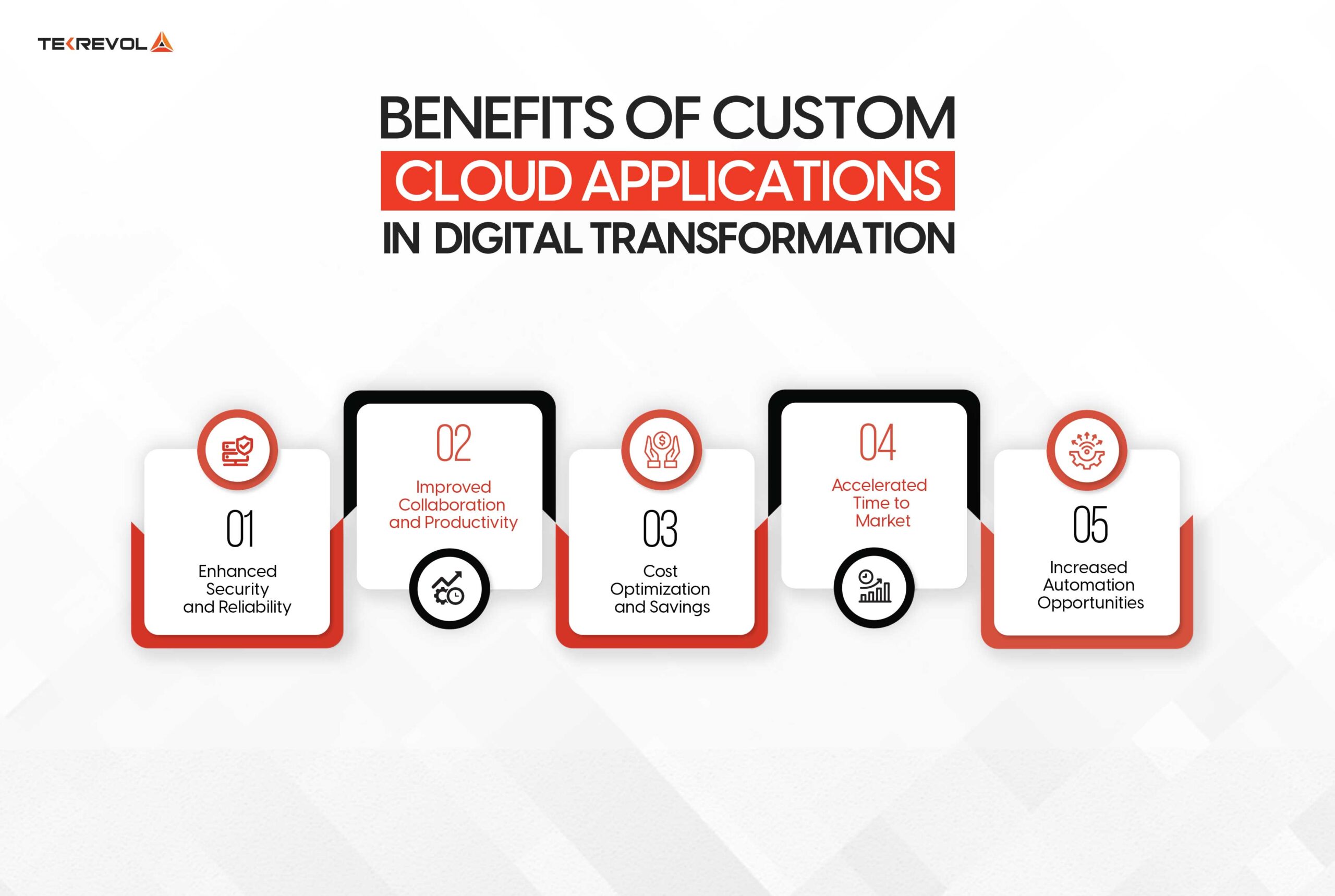
Cloud computing is revolutionizing how businesses operate, offering a powerful engine for digital transformation. For CIOs, CTOs, and business owners, leveraging the cloud’s capabilities is no longer a question of if, but how. Let’s explore the key advantages:
1. Enhanced Security And Reliability
Cloud providers invest heavily in robust security measures that far exceed the capabilities of most individual organizations. This includes multi-layered security protocols such as advanced encryption, multi-factor authentication, and intrusion detection systems, constantly monitored by specialized security teams.
Data is often replicated across multiple geographically diverse data centers, ensuring business continuity even during unforeseen events like natural disasters or hardware failures. This robust approach minimizes downtime and protects sensitive data.
These advantages translate into the following key benefits:
- Risk Reduction: The exposure to cyber threats and data breaches is dramatically reduced.
- Uptime: Applications and data availability are consistent; fewer service disruptions are experienced.
- Compliance: Adherence to industry regulations and compliance standards is eased.
Example: A banking institution using cloud computing resources enjoys improved security measures along with data backup support, which is guaranteed to meet the most stringent regulatory requirements while streamlining IT infrastructure costs.
2. Improved Collaboration And Productivity
Cloud-based collaboration tools make it easy to work together with no regard to where team members are located around the globe. Real-time communication tools, embedded file-sharing capabilities, and centralized data storage simplify workflows and thus enable increased communication. This also helps for speedy project completions and general improvement in efficiency.
According to statistics, the appropriate use of the cloud will boost application development and maintenance productivity by as much as 38%. A productive and efficient working force is what it results in, as these are confirmed by the key benefits: Sharing documents and data across gadgets and departments with easy access.
- Sharing documents and data across gadgets and departments with easy access.
- Real-time communication tools make instant collaboration and feedback.
- Remote work may be efficient and productive, allowing for a broader talent pool and reducing overheads.
3. Cost Optimization And Savings
The cloud eliminates the hefty capital costs attributed to on-premises hardware and software. With flexible pricing models like pay-as-you-go (PAYG) and reserved instances, organizations can optimize their costs based on actual usage.
This PAYG model, coupled with the speed of cloud application development services, allows faster innovation and building as well as integration of new applications and systems in days or weeks. This increases the time-to-market, and the increased spending on the IT workforce and other initiatives is sufficiently offset.
These savings in cost reflect the following key benefits:
- Reduced IT Expenditure: Huge savings in hardware, software licenses, and IT staff.
- Predictable Budgeting: Transparent pricing structures help plan the budget accordingly.
- Scalability: Resources are easily scalable up and down according to the variating demands without wasting unused capacity.
4. Accelerated Time To Market
Cloud-based infrastructure provides ready-to-use resources, dramatically reducing the time to deploy new applications and services. This enables faster innovation cycles, increased agility, and a significant competitive advantage. The speed and efficiency of cloud application development services allow businesses to respond quickly to market changes and customer demands.
This translates into the following key advantages:
- Rapid prototyping and testing of new ideas.
- Quick response to market changes and customer demands.
- Faster product launches provide a significant edge in the marketplace.
5. Increased Automation Opportunities
Cloud platforms offer extensive automation capabilities, streamlining various aspects of business operations. This includes automated scaling of resources, continuous security monitoring, automated backups and disaster recovery, and workflow automation. The cloud enables the creation of “digital-first” business models characterized by data-oriented, highly adaptable, asset-light, and anywhere services.
The benefits of this automation are:
- Infrastructure Management: Automated scaling of resources based on demand.
- Security Monitoring: Continuous monitoring and automated responses to security threats.
- Data Backup and Recovery: Automated backups and disaster recovery plans ensure business continuity.
- Workflow Automation: Automating routine tasks improves efficiency and reduces human error.
- Struggling to Scale with Cloud Technology?
- Let TekRevol’s experts build a custom cloud solution tailored to your unique business needs.
Strategies For Successful Cloud Adoption In Digital Transformation
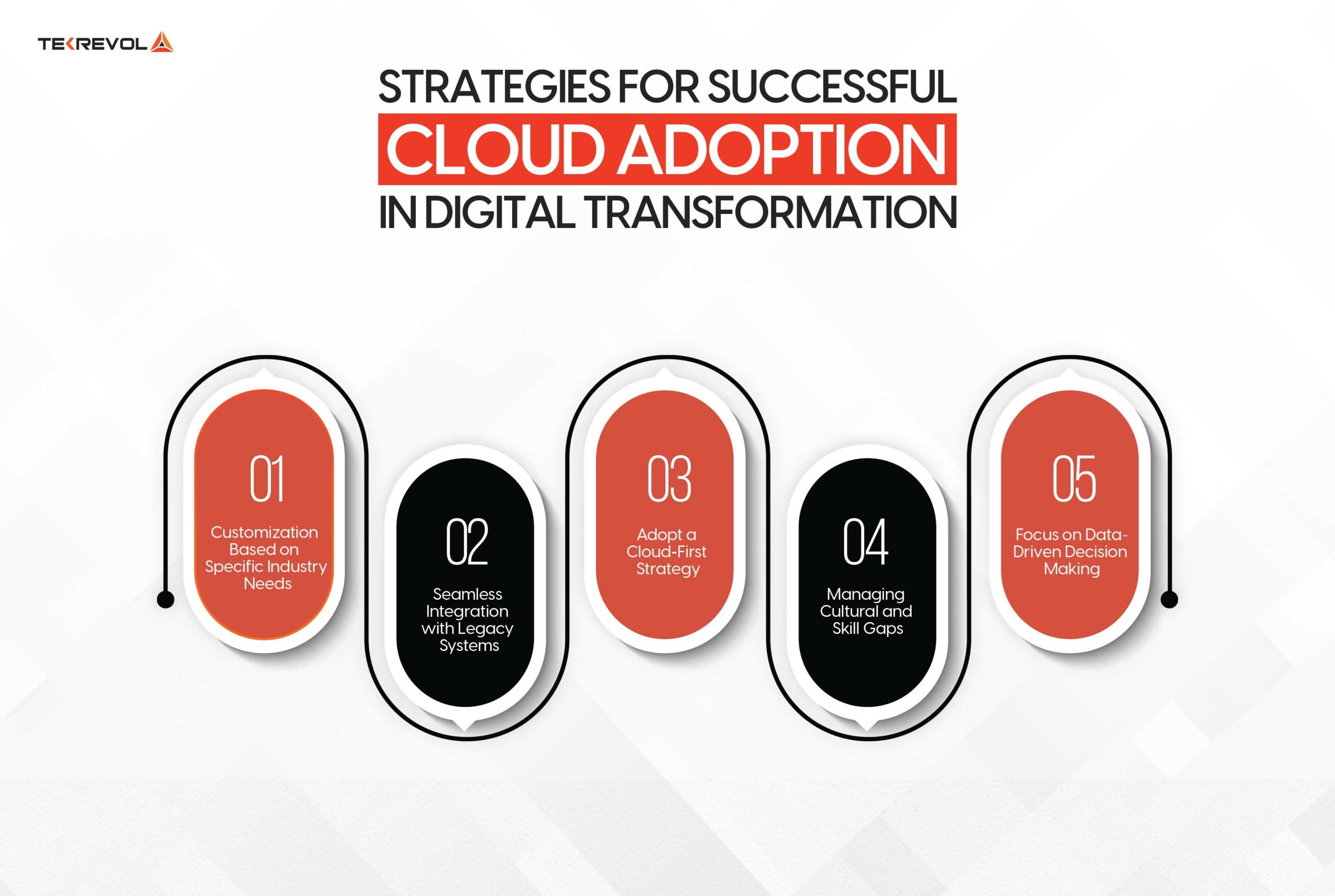
Adopting cloud solutions can be a game-changer for businesses. However, it requires careful planning and execution. Here are some industry-focused strategies to ensure successful cloud adoption.
Customization Based On Specific Industry Needs
Every industry has specific issues. Custom cloud applications can meet requirements. For example, a retail company may require a cloud application to monitor inventory levels in real-time. Thus, tailoring solutions can enhance efficiency and customer satisfaction for a particular business.
Tip: Have a needs assessment to determine what features are critical to your industry.
Seamless Integration With Legacy Systems
Most businesses utilize one or more legacy systems. A sound cloud adoption strategy always integrates these legacy systems with a new cloud solution. For example, a financial company can have an easy flow by integrating cloud-based tools with traditional software.
Tip: Consult with IT experts and have a clean integration plan free from any disruption.
Adopt A Cloud-First Strategy
A cloud-first strategy is when a company adopts cloud solutions for new applications. It fosters innovation and agility. Some companies, like Netflix, have adopted this practice from the very beginning, enabling them to scale up quickly and better respond to customers’ demands.
Tip: Develop a roadmap that illustrates how cloud solutions will be used in the organization.
Managing Cultural And Skill Gaps
Moving to the cloud may create gaps in terms of skills within an organization. An example is a manufacturing company with employees who may not know about cloud technology. Companies can offer training schemes and workshops to fill these gaps.
Tip: Create a learning culture whereby resources and appropriate support are provided for employees to learn new skills.
Focus On Data-Driven Decision Making
Cloud solutions enable organizations to collect and analyze data pretty efficiently. Companies like Amazon make decisions concerning inventory, customer preferences, and so on using that data. Using data-driven strategies, business houses can make the right decisions that will reap better results.
Tip: You need analytic tools embedded in your cloud applications to know the insights that may help determine your business strategy.
Wonder What Software Will Dictate Our Future? Read More on: 18 Types of Software Development that Will Dominate 2025 and Beyond
How Custom Cloud Applications Are Transforming Major Industries
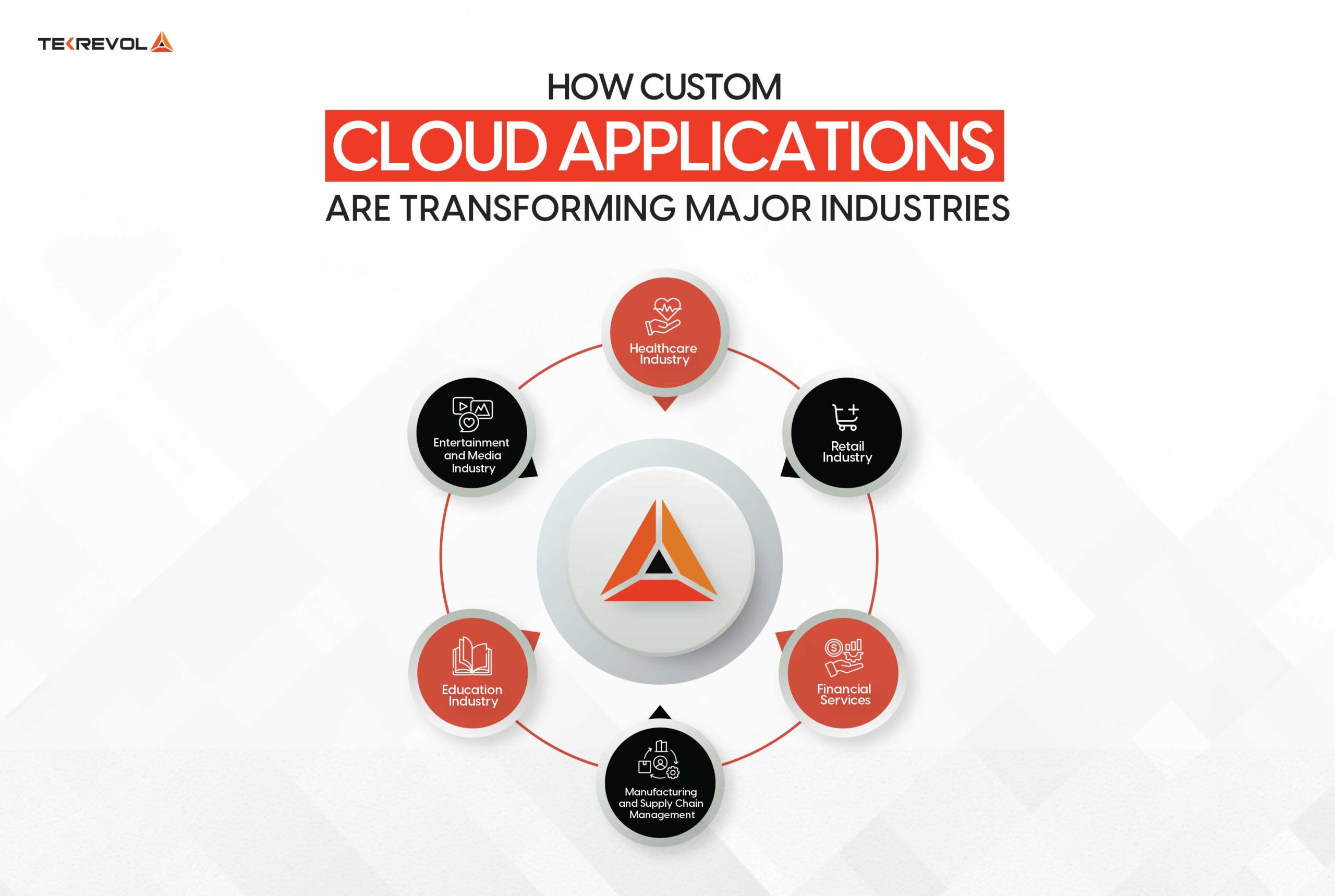
Custom cloud applications have transformed numerous industries, improved efficiency, and enhanced the lives of their customers while fostering innovation. Let’s explore how different sectors can benefit from these technologies.
Healthcare Industry
Cloud adoption is significantly shifting the face of the healthcare industry. Researchers believe that up to 70% of healthcare organizations are already using cloud solutions for safely saving sensitive patient data. Top hospital group Mount Sinai Health System came up with a customized cloud app for patient record management, giving doctors real-time access to data for improved care quality and keeping in line with HIPAA regulations.
Others include the Cleveland Clinic and many others using cloud-based telemedicine services to make access to health care across different regions both accessible and efficient.
Retail Industry
Cloud technology has transformed retail, an industry that depends heavily on real-time data. Walmart, the world’s largest retailer, uses custom cloud applications to better optimize its supply chain. Walmart tracked its item inventory in real-time across its global network, thus reducing product shortages and improving customer satisfaction.
Other than Walmart, other retailers like Amazon run their global eCommerce platforms on cloud technology, processing millions of transactions fast and without making any errors daily.
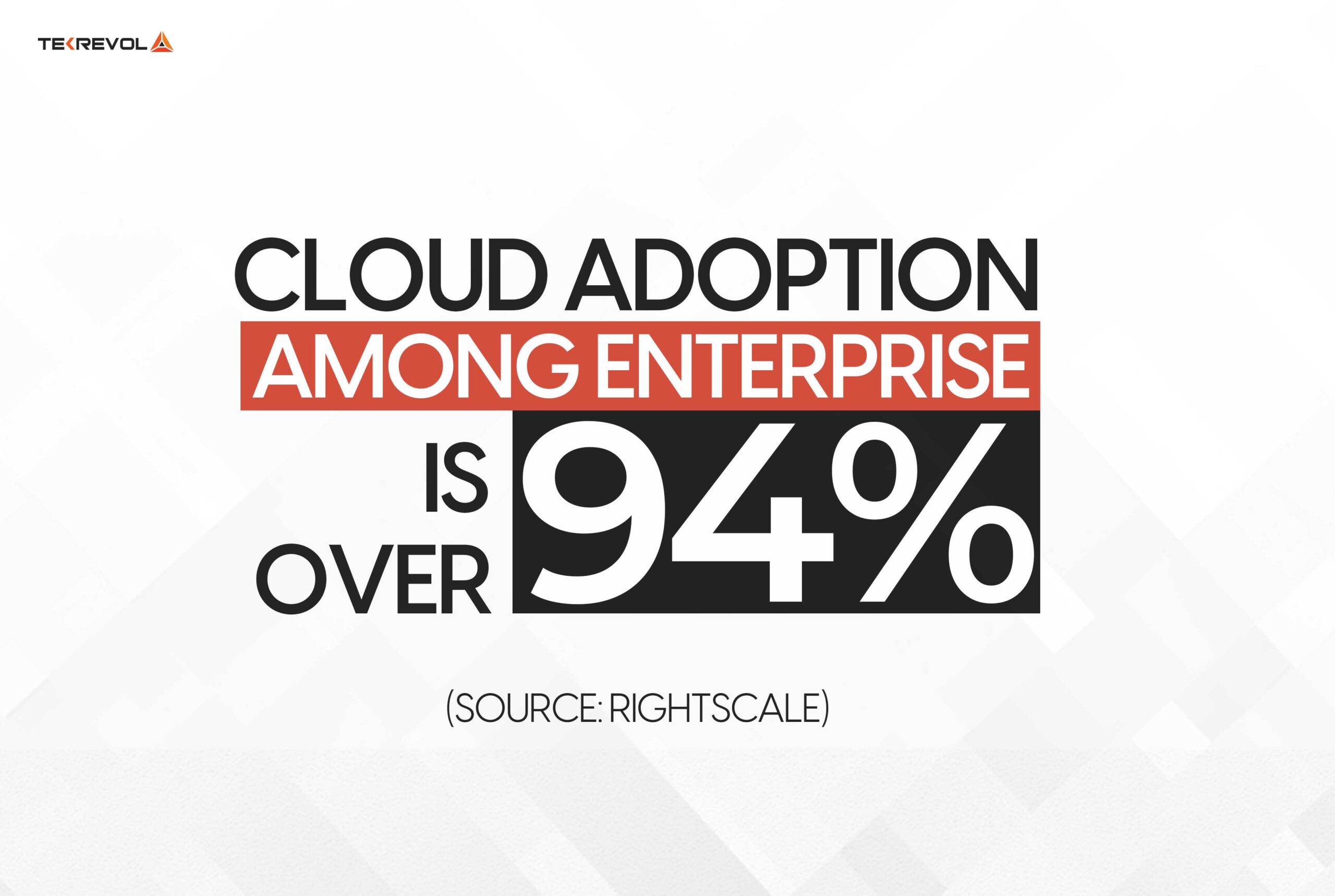
Financial Services
Cloud technology has also become essential in financial services. Most banks and other financial institutions make use of faster and more secure cloud-based services. In this line of service, American Express came up with bespoke cloud solutions that allowed the company to avail itself of customized banking experiences. Their platform helped customers monitor spending habits and even made recommendations for giving back.
More specifically, some organizations such as Capital One have leveraged cloud innovations to enhance the streamlining of services, offer maximum security for transactions, and capabilities for fraud detection, all with considerable fraud incidents diminution.
Manufacturing And Supply Chain Management
Manufacturing’s adoption of the cloud has brought with it major operational efficiency gains. At (General Electric) GE, custom-built cloud solutions track the performance of equipment across plants, whereas IoT-enabled applications permit it to predict when pieces of equipment will break down and perform preventive maintenance.
Other manufacturing giants, such as Siemens, also use the solution to connect factory systems using cloud-based systems so that they can carry on smarter and better supply chain management.
Education Industry
Cloud technology is transforming the education sector, which is becoming available regarding experiences. Companies like Coursera ranked as one of the largest online education providers, have capitalized on cloud custom applications for course courses for millions of students worldwide. Students are now able to get all their educational material anywhere and at any time through the use of cloud solutions.
Other learning platforms, such as edX, use the same model where there is a cloud-based approach to learning to ensure that learners across the world have an uninterrupted learning experience.
Entertainment And Media Industry
The entertainment industry has seen a radical shift thanks to cloud computing. Netflix, a leader in media streaming, relies on custom cloud-based infrastructure to deliver content to over 200 million subscribers globally. Their cloud platform scales seamlessly to handle peak demand, ensuring uninterrupted streaming.
In addition to Netflix, companies like Disney+ and Spotify use cloud technologies to power their streaming services, offering personalized content recommendations and handling millions of user requests simultaneously.
- Ready to Accelerate Your Digital Transformation?
- Partner with TekRevol and let our experts develop agile, scalable cloud solutions for your growth.
Key Challenges In Custom Cloud Application Development
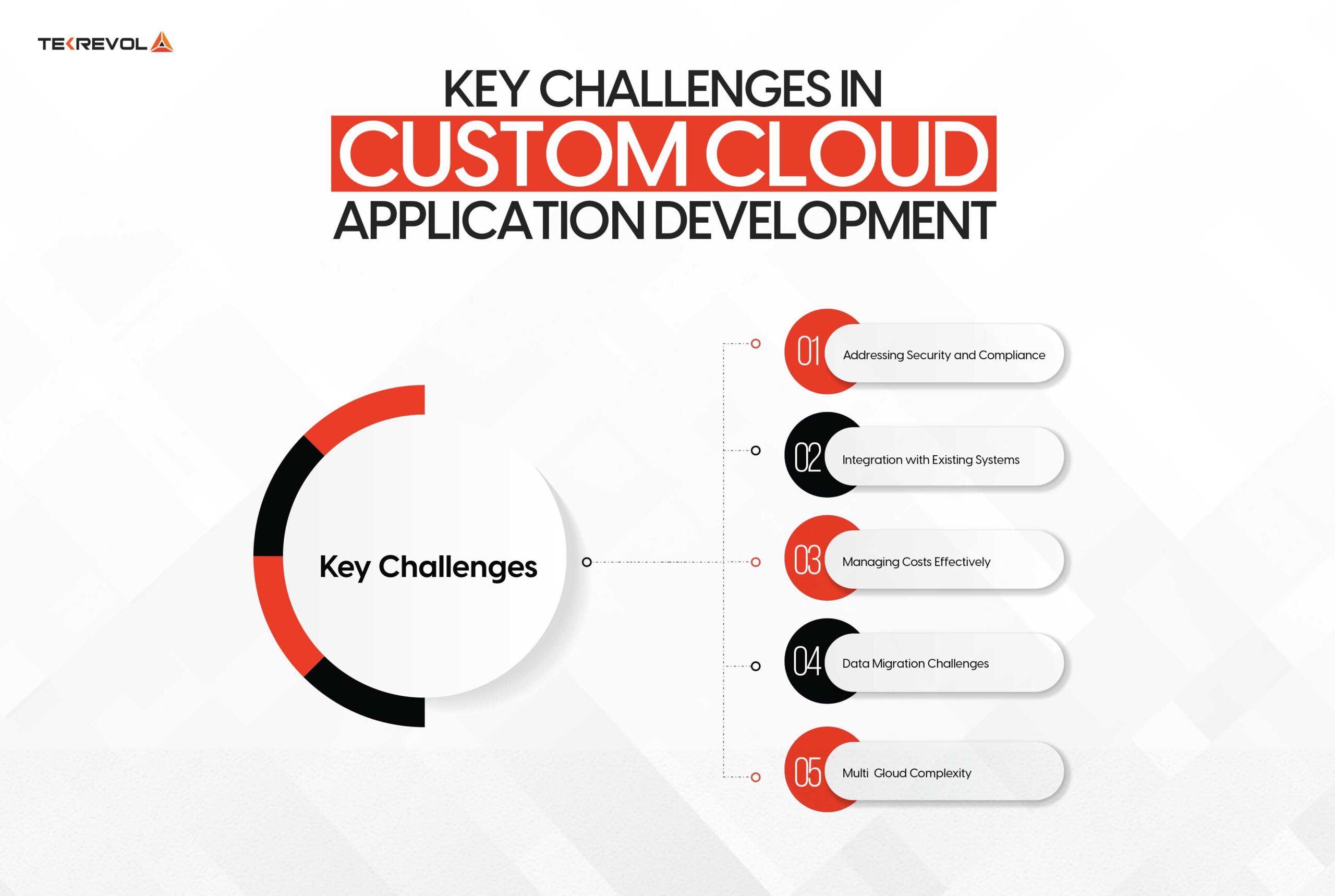
While cloud technology offers many benefits, its implementation comes with a fair share of challenges. Stats suggest that 66% of IT professionals consider security to be a major challenge to cloud adoption. Let’s explore some of the key challenges in custom cloud application development.
Addressing Security And Compliance
Security is a major concern for businesses moving to the cloud. When multiple customers share cloud infrastructure, it can lead to vulnerabilities. A security breach can expose sensitive data, putting both the company and its customers at risk. Additionally, keeping up with regulations like GDPR and HIPAA adds another layer of complexity.
Solution:
- Implement strong security controls and monitor your cloud environment.
- Use encryption and access controls to protect data.
- Conduct regular security audits to identify vulnerabilities.
- Train employees on best practices for cloud security.
Integration With Existing Systems
Integrating new cloud applications with older systems can be tricky. Many companies face challenges due to different technologies and data formats. This can lead to disruptions in business operations and affect productivity.
Solution:
- Develop a clear integration strategy before starting.
- Use middleware or APIs to connect old and new systems.
- Test integrations thoroughly to ensure they work smoothly.
- Involve IT experts who understand both legacy and cloud systems.
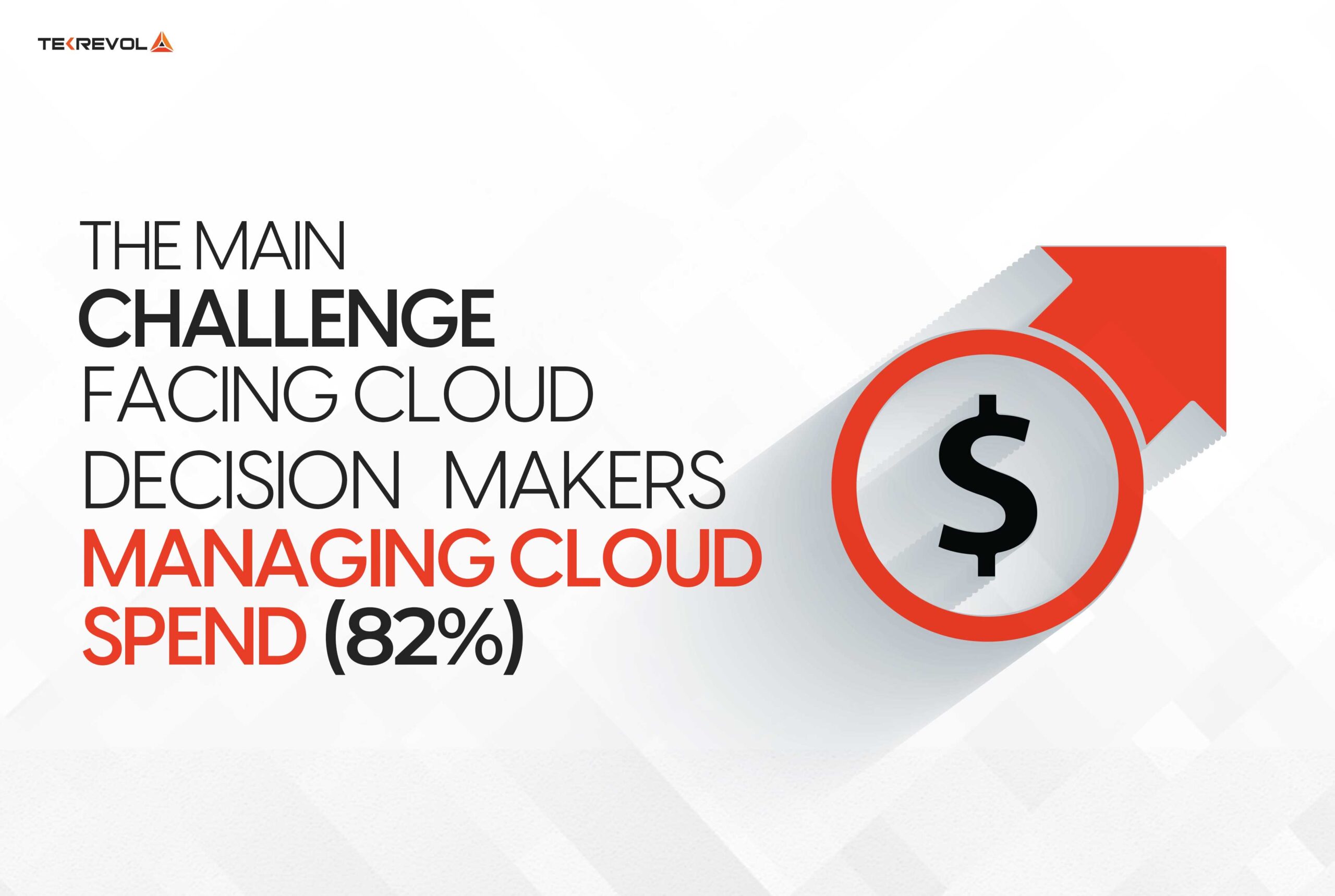
Managing Costs Effectively
Cloud costs can spiral out of control if not managed properly. Companies often face unexpected expenses due to data transfer, storage, or overused resources. In fact, stats suggest nearly 50% of businesses struggle to control cloud costs while adopting.
Solution:
- Use cloud cost management tools to track expenses.
- Implement auto-scaling to adjust resources based on demand.
- Regularly review cloud usage to find areas to cut costs.
- Set governance policies to prevent overprovisioning and unexpected charges.
Data Migration Challenges
Moving data and applications to the cloud can be complex. There is a risk of data loss or downtime during migration. The entire process can take a lot of time and money, which can be stressful for organizations.
Solution:
- Plan your data migration carefully and understand your needs.
- Choose the right migration strategy, like lift-and-shift or re-platforming.
- Back up your data and perform test migrations.
- Have a rollback plan in case things go wrong.
Multi-Cloud Complexity
Managing multiple cloud environments can be a major headache. Each provider has its own tools and billing structures, making it hard to keep track of everything. This can lead to confusion and inefficiencies.
Solution:
- Use a cloud management platform to oversee multiple environments.
- Create governance policies to ensure effective management.
- Regularly review and optimize each cloud provider’s usage.
- Accelerate Your Cloud Migration
- Experience a smooth, risk-free migration with our specialized cloud consultancy services.
Best Practices For Cloud Implementation In Digital Transformation
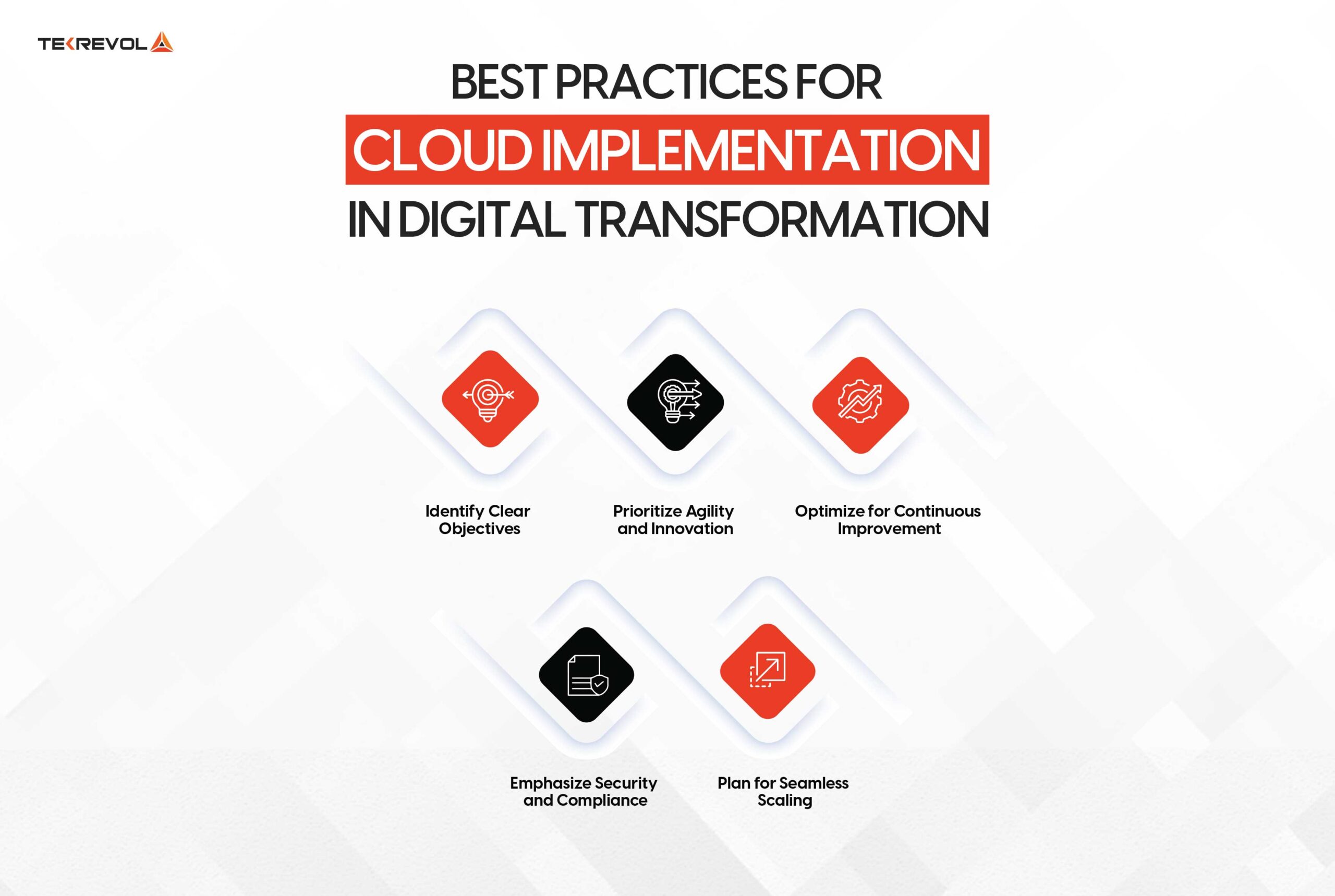
Implementing cloud application development services effectively requires a mix of strategic planning and adaptability. To maximize the benefits, organizations need to ensure seamless integration while maintaining security and flexibility.
Identify Clear Objectives
Before starting cloud application development services, define your specific goals. Whether you’re focused on scaling your operations, improving security, or cutting costs, having clear objectives ensures your strategy is laser-focused. This approach keeps your cloud transformation aligned with business growth.
Prioritize Agility And Innovation
Leverage the agility offered by cloud application development services to innovate faster. Adopt a DevOps approach to quickly iterate and deploy updates, ensuring your applications meet evolving customer needs. This agility not only keeps you competitive but also helps you respond to market changes rapidly.
Optimize For Continuous Improvement
Cloud environments are dynamic, so ongoing optimization is key. Use performance metrics and monitoring tools to fine-tune your cloud applications regularly. This approach ensures that you’re maximizing both resource usage and cost efficiency while improving application performance over time.
Emphasize Security And Compliance
Building custom cloud applications demands a robust security framework. Use encryption, access control, and compliance tools from the beginning. For industries like finance or healthcare, integrating strong security protocols into your cloud application development services guarantees that sensitive data stays protected and compliant with regulations.
Plan For Seamless Scaling
One of the primary advantages of cloud application development services is the ability to scale easily. Plan for both horizontal and vertical scaling to ensure your infrastructure grows with your business. Use auto-scaling features to adjust resources as demand increases, ensuring consistent performance even during peak times.
Why Tekrevol For Your Cloud Application Development
At Tekrevol, we realize that every business has unique needs when it comes to cloud application development. That’s why we offer tailored solutions that cater to your specific requirements. With years of experience in providing top-notch cloud application development services, we have honed our skills in designing bespoke solutions that drive digital transformation.
Our team of expert developers, consultants, and engineers work hand-in-hand with you to understand your business goals and objectives and then craft a cloud strategy that aligns with your vision. With our comprehensive cloud consulting services, you can rest assured that you’re in good hands.
Here are just a few reasons why you should choose Tekrevol as your trusted cloud application development company:
5+ years of experience in cloud application development services
- Proven track record of delivering scalable and secure solutions
- Expertise in multiple cloud platforms and technologies
- Agile and flexible approach to cloud development projects
- Multi-cloud and hybrid strategies for flexibility
- DevOps and CI/CD implementation for efficiency
- Cloud cost optimization for maximum ROI
Conclusion
Custom cloud applications are the engine that powers digital transformation. They give businesses the tools to scale, adapt, and innovate in ways that traditional solutions can’t match. With enhanced flexibility, security, and productivity, cloud applications are vital for staying competitive.
Want to scale efficiently without the hassle of outdated systems? It’s time to take the next step. Start building your custom cloud applications now to drive efficiency and growth. Take action today and set your business up for long-term success in the digital age.
- Looking to Develop a Custom Cloud App?
- Partner with TekRevol’s expert developers for scalable, future-proof solutions.

 2756 Views
2756 Views October 16, 2024
October 16, 2024









